A grassroots program is responding to Charleston’s substance use epidemic, but stigma and an open police investigation are keeping people from getting help.
This story was originally published by Mountain State Spotlight. For more stories from Mountain State Spotlight visit their website.
On a Wednesday evening in mid-October, people gathered in a parking lot off of Kanawha Boulevard in Charleston, West Virginia. A man played guitar; a woman talked about the perils of virtual schooling during the pandemic. Blue and green canopy tents covered folding tables that were set up with snacks and bags of fluffy sandwich rolls.
A makeshift wound-treatment center stood under one of the tents. The ground to its right, coated in layers of pastel-colored chalk, read “HIV TESTING” and directed people to a van that served as a temporary medical lab.
It was the atmosphere of a carnival and a refuge wrapped into one; free and welcoming to some of Charleston’s most stigmatized people — drug users and those who loved them. But HIV in Kanawha County was spreading at an unprecedented rate, and people were scared.
“I’m sorry, I’m just so nervous,” said a woman named Stephanie, standing near the mobile testing clinic. Her eyes scrunched closed as a nurse squeezed a pin-sized drop of blood from her middle finger. She held a cigarette in her other hand, which she drew to her lips and finished off with a long inhale.
“I don’t normally like to smoke around other people,” she apologized. “But right now, I can’t help it. I’m just so nervous. Oh God.”
Like most of the people in line, Stephanie — tall, with sandy hair piled high into a messy bun — uses intravenous drugs. She injects. And she asked that her last name not be published for fear of retribution, because in addition to getting tested for HIV, she had come out to the parking lot to pick up a supply of clean, sterile syringes.

For decades, supplying people who inject drugs with clean needles has been proven a necessary practice in preventive medicine. Science has shown that syringe access programs, commonly called needle exchanges, prevent the spread of infectious diseases like Hepatitis C and HIV, can reduce the amount of syringe litter in a community and do not increase drug use. Needs-based programs, or those with low barriers to entry, such as not requiring people to bring a needle back to get another one, have been shown to be the most effective at preventing the spread of disease.
But as the overdose epidemic raged on in Kanawha County and experts warned an HIV outbreak was on the horizon, Stephanie and others like her faced a related crisis: one of logistics. Clean needles were increasingly difficult to come by. People were reusing and sharing out of desperation.
In March 2018, Charleston suspended its health-department run needle exchange. The move left the state capital providing far fewer sterile needles — through a separate program — than much smaller communities across the state according to previously unreported data obtained by Mountain State Spotlight.
Despite being the biggest city in the state, Charleston’s program is third from the bottom in terms of syringes distributed per 100,000 residents, according to the data, comparing certified harm reduction programs statewide.
“People can’t get needles,” Stephanie said as she waited for her test result. “I’ve watched them dig used ones out of the dirt and inject because they’re that desperate. I’ve seen needles break in people’s arms.”
By Spring 2020, nonprofit Solutions Oriented Addiction Response, WV — known as SOAR — began holding these biweekly gatherings in order to try and fill that void. Local residents came to these hushed parking lot meet-ups to get access to free, sterile sharps and life-saving medications — as well as food, water, first aid and HIV testing.
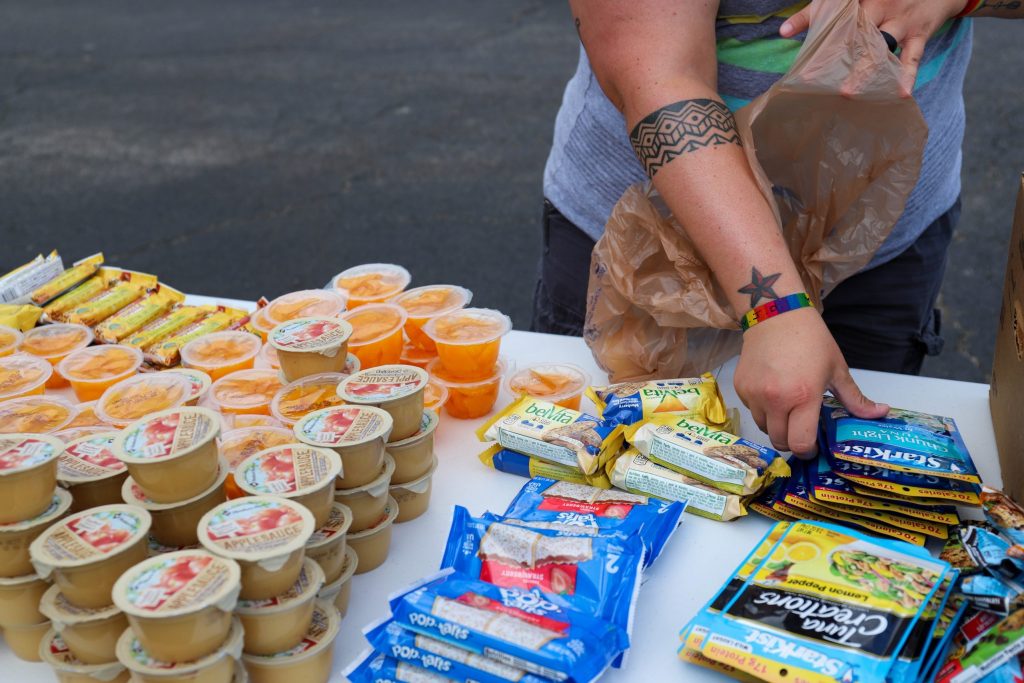
Stephanie stood in the lot and finished her second cigarette. Around 25 minutes after she was tested, she was called back to the tent.
“Negative,” the nurse told her.
She brought her hand up to her heart and collapsed forward in a deep exhale. Another person wasn’t as lucky. They were taken behind a thick, tarp-like curtain. Positive.
Stephanie gathered her things.
“Thank you, guys. You guys save us. Every week you save us,” she shouted back towards the tents as she took her bag of needles and naloxone and exited the parking lot. “I’ll see you all next [time].”
But Stephanie, like 95 percent of the clients SOAR served, wouldn’t be back.
In the following week, after a local TV segment aired on the underground exchange, Charleston Police opened an investigation into the nonprofit on the grounds that it may have violated a city ordinance requiring harm reduction programs be either approved by the police chief or licensed by the state.
In response to questions sent via email, Charleston Mayor Amy Goodwin wrote the decision about whether SOAR should operate in Charleston should be made by public health and medical professionals.
“If they determine the need is there, then [they] should determine the next step forward,” wrote Goodwin. “However, any harm reduction program that operates in Charleston must follow the best practices of federal and state health officials.”
SOAR maintains that its distribution of syringes did not violate Charleston city law, which does not explicitly forbid the distribution of syringes without consent. There’s also no state law that makes distributing syringes illegal. Even so, in response, the organization temporarily suspended its needle exchange.
Again, some of Charleston’s most vulnerable have been left without safe injection supplies, and HIV continues to spread.
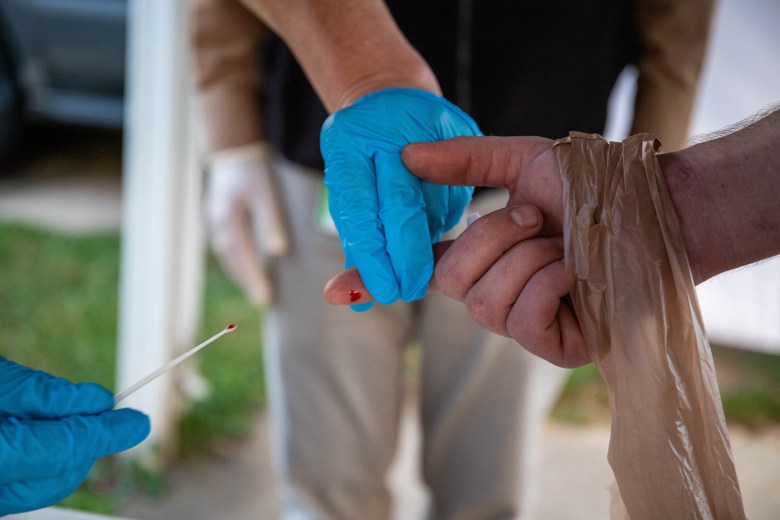
“Historically, in a year’s time in Kanawha, we would have less than five new cases of HIV associated with injected drug use,” said Christine Teague, who has served as the director for the HIV Intervention Program at Charleston Area Medical Center since 2001.
This year, Teague says they’ve identified 32 — more than double the number of HIV cases linked to drug use that were reported in 2019 — with still two weeks to go in the year. And that increase came despite a substantial drop in testing: statewide HIV testing dropped by more than 30 percent from previous years, largely due to COVID-19.
“If that doesn’t open your eyes, I don’t know what would,” Teague said.
Science v. stigma
The image attached to addiction is often one of dark, scary outcasts — delinquents who lurk in the shadows and choose lives on the streets.
The fact of the matter is this: many of the people SOAR serves are experiencing homelessness and struggling with substance use disorders. But nobody chooses to live this way.
Some were born into addiction. Many grew up in middle-class families, were prescribed painkillers after an accident, got hooked and ended up losing their homes. Others hold down jobs, take care of kids, have hobbies, coach soccer, get by undetected and struggle in silence until they enter recovery or die.
“These are people. They’re just plain people like you and I and everybody else. And they have this horrible disease. I wouldn’t wish it on anybody,” said Dr. Josiah Rich, a professor of epidemiology and medicine at Brown University.
“That’s why these syringe access programs are so wonderful. Because people show up and instead of being told that they’re abusers, that they’re weak, that they’re noncompliant, they’re treated like people. They’re shown respect.”
That, said Rich, is what gets people into recovery. Syringe access programs — often called harm reduction programs — provide a point of contact, an introduction to resources without fear of beratement, cruelty or stigma. People who have access to them are three times more likely to enter long-term recovery when the time is right, he said.
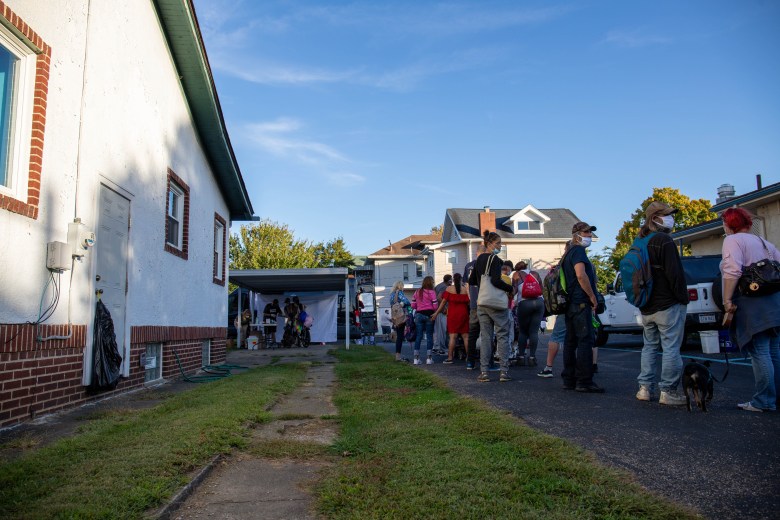
But not all programs are created equal.
West Virginia has 14 certified harm reduction programs currently operating across the state. Since the end of the health-department run program in 2018, the only certified option in Kanawha County is West Virginia Health Right, which operates out of a clinic in the city’s East End.
For the past three years, the program has provided a pass for county officials who, when asked to address the needle shortage in the city, point to Health Right as an example of a harm reduction program already in place.
“There is a place for accountable, well-run, harm reduction programs with wrap-around services,” wrote Kanawha-Charleston Health Department Executive Director Dr. Sherri Young, when asked via email whether there was a need for increased harm reduction services in Charleston, including syringe access services.
“West Virginia Health Right’s harm reduction program provides syringe access as well as important linkage to PrEP therapy, naloxone training, drug treatment, and health care, including HIV and hepatitis testing, and family planning services,” Young wrote.
But experts in epidemiology and the transmission of HIV say West Virginia Health Right’s program has requirements in place that contradict best-practices and reduces participation by, for example, requiring identification, marking syringes with serial numbers and implementing a strict one-for-one exchange.
Although half of the certified programs in the state currently list that they operate as one-for-one exchanges, West Virginia Health Right distributes thousands fewer syringes each year.
“The program in Charleston is unusually high-barrier,” said Robin Pollini, a substance use and infectious disease epidemiologist at West Virginia University, who has spent the last 20 years studying injection drug use. “I’ve worked with programs around the country and I’ve never seen another one like it before.”
West Virginia Health Right CEO Angie Settle did not return multiple interview requests made over a three week period, but in response to questions sent via email, she wrote that harm reduction programs in West Virginia face frequent threat of elimination, and that groups that call for unrestricted distribution are endangering other programs in the state.
“We know that an unaccountable syringe distribution model will not gain acceptance in our community or state, whether some like it or not,” Settle wrote.
Still, she added, “I’d like to think different treatment models may coexist with community support.”
Settle did not answer questions about how her program operates, the number of people it serves, or the low syringe distribution numbers. In a recent Facebook post, however, Settle rejected the criticism that her program has too many restrictions that reduce participation.
But in 2018, she laid out a stricter mindset in an interview with WSAZ. “If you come back without every needle, you will not get any more needles,” Settle said. “There are no second chances.”
That’s in contrast to programs in Morgantown and Huntington, which are also certified by the state but don’t include the same stringent requirements.
In Morgantown, the program is entirely needs-based. The program in Cabell County operates on a one-for-one plus model, which “offers flexibility when participants do not have enough — or possibly any — non-sterile syringes to exchange,” according the West Virginia Department of Health and Human Resources.
And the efficacy of the different approaches is clear in needle distribution data obtained by Mountain State Spotlight.
Although Monongalia County and Cabell County are both significantly smaller than Kanawha County, the program in Morgantown distributed 462,820 sterile syringes since the beginning of the year, while the program in Huntington distributed 320,050.
The program in Charleston distributed just 13,470.
That means in the past year, Charleston’s program distributed 2.9 percent of the safe injection supplies that residents living near Morgantown received.
The different approaches are also reflected in HIV rates. In Monongalia County, fewer than five cases of HIV linked to injection drug use are reported a year. From 2013 to 2016, there wasn’t a single case.
In Cabell County, after a spike in HIV rates in 2018 led to federal intervention and a relaxing of the county’s syringe exchange requirements, new HIV cases linked to drug use are declining.
In Charleston, however, HIV rates are rising and needles remain an unrelentingly stigmatized and misunderstood tool. To date, despite decades of academic research, government reports and dozens of articles projecting the very crisis the city’s now facing, no consequential government action has been taken to increase accessibility to sterile syringes and protect the community from the spread of HIV.
Mountain State Spotlight contacted 21 experts across the country working in fields including epidemiology, public health and specializing in substance use disorder. Not one said the current certified program in Kanawha County is meeting the need for clean syringes.
“Until you can show me that every single person who is at risk and would benefit from a syringe exchange program has access to one, you don’t have enough programs,” said Rich, the Brown University professor. “If HIV rates are going up like that, whatever program is in place isn’t doing the job.”
Changing hearts and minds
Before SOAR became the largest provider of sterile syringes and safe injection supplies in the county, and later the subject of a Charleston Police investigation, it was just Joe Solomon and his ever-expanding group of friends and acquaintances coming together for food and conversation.
“Pizza and ice cream. That’s all it takes,” said Solomon, shrugging his shoulders and eyebrows in unison. “The pizza comes out and everybody wants to hang!”
Solomon, who co-founded SOAR with Sarah Stone in 2018 and holds a master’s in social work from Marshall University, carries an ever-present air of playful wit. But the thing about the pizza holds some truth. SOAR’s guiding philosophy is that if you make resources available to people, they will come. Whether it’s pizza or needles, getting people in the same room is always the first step.
What started with community conversations, evolved into naloxone distribution services. And by spring of 2020, SOAR was offering grassroots syringe access services, too. As the Wednesday night clinics evolved, the services expanded.
Local nursing students came out. People from the West Virginia Center on Budget and Policy, a nonpartisan policy research organization, helped folks get their stimulus checks. Community members packed donor-funded supplies. There was a recovery coach present for those who wanted one. Local clinics and a retired doctor offered medical services on the spot.
“We come here and we feel welcomed,” said a woman who goes by TiTi (tee-tee) during a Wednesday earlier this year. “You think I’m going to go to the hospital for help? No ma’am. Not unless I’m bleeding out. There’s so much judgment. But here I can get what I need. We feel good, safe.”
Of course, at the center of it all, were the needles.
The science and research behind needle exchanges and harm reduction isn’t new; public health agencies including the CDC have been advocating for their use since the early 1990s. Research found that providing people who inject drugs with access to clean needles drastically reduced the transmission of infectious disease, like HIV and Hepatitis C. Despite widespread misconception, the programs did not increase the likelihood of drug use.
“Instead of ignoring the fact that risks are going to be taken, let’s acknowledge that they will be, and give people the tools and the information necessary to keep them as safe as possible when engaging in those risky behaviors,” said Julia Marcus, an epidemiologist and professor at Harvard Medical School.
And harm reduction strategies can be used to mitigate other behaviors that are risky to public health, too. Most recently, some experts have said those lessons could be applied to fighting the COVID-19 pandemic.
Wear a mask. Stand 6 feet apart. If you’re going to gather, do it outdoors instead of in.
It’s a similar principle applied to syringe access programs. The difference is stigma.
“I mean it’s crazy,” Rich said. “[Substance use disorder] is a disease and yet we treat it like a crime. We treat people with the disease as criminals.”
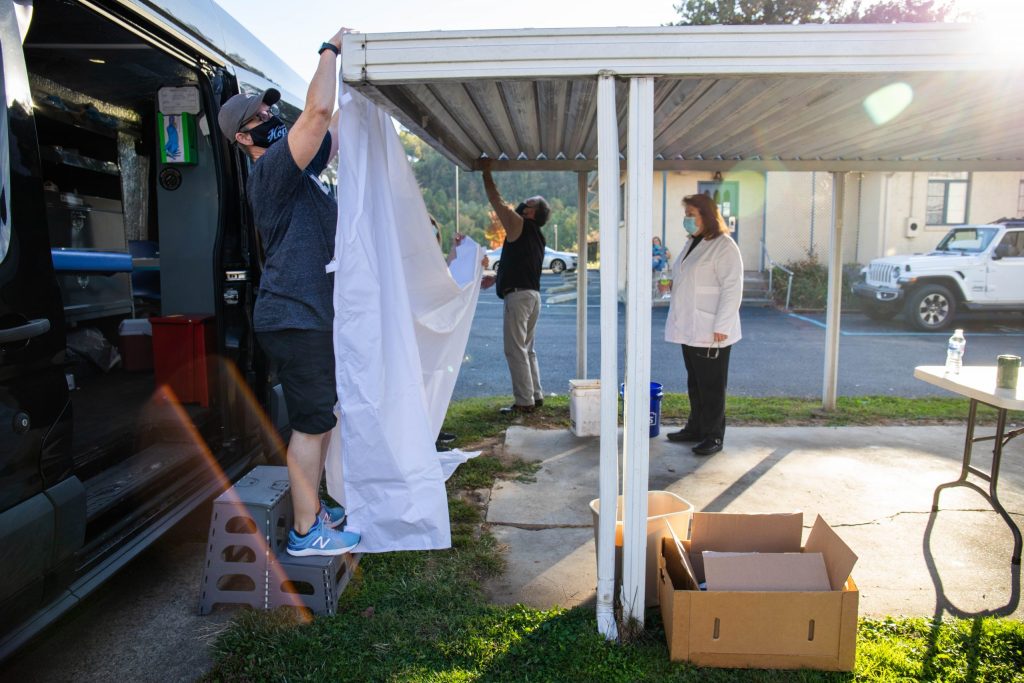
And this criminalization of addiction is what sowed the seeds for Charleston’s current HIV outbreak.
At its peak in 2018, the Kanawha-Charleston Health Department’s needle exchange program served 483 people in a single day, providing access to testing for Hepatitis C and HIV, emergency contraceptives and referrals to recovery services and primary health care. Of the almost 25,000 unique individuals who used services at least once over the course of its brief tenure, nearly 2,000 said they lived within the City of Charleston.
If that data is accurate, then approximately 4 percent of the city’s residents used the syringe services program at least once during the two years it operated.
But in his fourth and final term in office, amidst a contentious election for his replacement, then-Charleston Mayor Danny Jones thrust the program into the spotlight, calling it a “needle mill” and pushing for its elimination.
Despite the warnings of experts, the Kanawha-Charleston Health Department suspended the program in March 2018. In May of that year, the West Virginia Department of Health and Human Resources released a report on the health department-run program, largely critiquing it for not placing a greater emphasis on getting people into treatment. But experts from around the country condemned that report for failing to understand the science behind needle exchanges and a harm reduction approach.
The result was a drought of sterile injection supplies.
That’s when SOAR stepped in.
“The idea was never to disparage anyone else working in harm reduction in the county,” said SOAR leader Brooke Parker. “It’s just we see a huge gap. And we’re doing our best to fill it. And it feels good to be a part of our community.”
Parker, petite, with blonde choppy hair, is originally from the Eastern Panhandle. She got involved with HIV prevention work as a teenager in Martinsburg, and since moving to Charleston in 2019, she’s been a driving force behind SOAR’s street outreach.
As time went on and the program grew, volunteers from other counties and states were coming to Charleston to take notes, in hope of adapting a grassroots model to take back to their own communities or share their knowledge.
“I don’t think any of us ever saw this getting as big as it did,” Parker said.
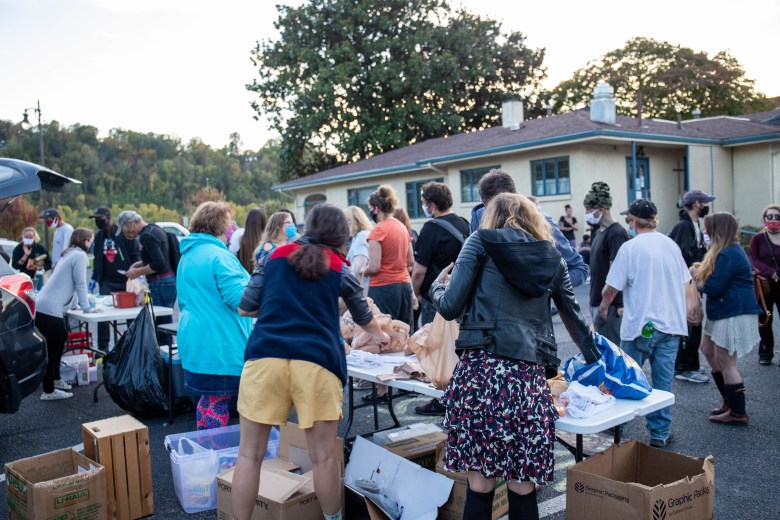
In August, Christine Teague and her team from Charleston Area Medical Center started coming out with SOAR. The partnership expanded the ability and effectiveness of HIV testing and prevention in Kanawha County by taking it directly to a population at highest risk.
Teague says in the three months they went out with the group, her team tested 91 individuals they hadn’t seen before. Eight were positive for HIV.
“It’s a staggering percentage,” she said. “People I’m talking to all say, well, there’s a lot more where that came from because we’re all together and we’re all sharing needles, so I’m concerned there are more that we just haven’t accessed yet.”
‘Doing Nothing is Unconscionable’
By mid-November, the SOAR Wednesday gatherings were nearly unrecognizable.
In the days, now weeks, following the TV reports, the launching of the police investigation, and the suspension of SOAR’s syringe access services, there had been city council meetings and angry Facebook posts. Threats made by strangers and fear about what the future might hold.
“I’m a social worker,” Parker said. “I’ve heard a lot of crazy shit, but nothing has felt like this before. It’s intense.”
In the time since SOAR stopped its syringe services, Parker has lost a lot of sleep. She can’t stop worrying about the clients, the people she’s cared for and developed relationships with. For Parker, this work is personal: she’s in long-term recovery, too.
It started with alcohol when she was a college student at Shepherd University. That led to pills and opioid use. She lost weight and friends and jobs. At the height of her battle, she was 85 pounds and really sick.
“I had a family to come home to, you know, and I had a family that loved me through it,” Parker said.
It’s something her dad always says: we love people through things.
By the time she moved to Charleston, Parker had been in recovery for more than a decade. Now, she has rock-climber arms. She runs ultra-marathons. Still, it wasn’t until a SOAR community meeting, back when she first met Joe Solomon, that she felt comfortable opening up publicly.
“I remember walking into this space, and it was the first time I had ever seen so many people stand up and introduce themselves and say, you know ‘I have two years in recovery’,” Parker said. “I’ve been sober since 2007, and I had never publicly identified as a person in long-term recovery until I moved here, largely because of stigma.”
Back in the parking lot, no more than 10 people made their way in and out over the course of the hour, leaving the typical tailgate-like energy a memory of Wednesdays past.
Of the few who did come through, most were looking for sharps.
“Sorry, man. Not this week,” Solomon said to a guy with a green backpack. “But we have flu shots?”
The mood was grim. The sky had gotten the memo. It was dark out — pitch-black — and pouring down rain.
The volunteers huddled under a tent. Time passed. Nobody came.
“We’ve lost like 90 percent of our people since we stopped giving out sharps,” Solomon said. He talked with his hands, which were concealed inside his raincoat— it was just two yellow sleeves waving in the air. “I mean this is what happens. You take away the sharps and now you can’t move naloxone. Or get people in front of a doctor. And there’s a fear that the cops are going to be hanging around, too.”
From the beginning, a major part of SOAR’s efforts has been its naloxone distribution and training, and data collection on overdose reversals or “saves”. On the last night they went out, before syringe distribution was suspended, they passed their 500th save. That’s more than 500 overdose reversals with naloxone distributed by SOAR since April.
The rain continued. The wind whistled. Eventually, two more people rolled in.
A thin man named Chris, who had come out in previous weeks, was looking for clean syringes. A woman named Krista came with him to get naloxone and snacks. She stood in the corner of the parking lot, smoking, while Chris and Solomon talked.
“I don’t use needles. I do use drugs, but I don’t use needles, thank God. But I know a lot of people that do and I’ve seen a lot of people [die] because of it,” Krista said. Rain droplets were rolling off of her black leather jacket, her thin-framed glasses fogged as she spoke. “I figured if I could help I would, so I’m here to support [Chris] and to get some of the Narcan.”
Chris walked across the lot. His hoodie was tied so tightly around his face, you could barely see his hazel-colored eyes. He was shaking.
“Corridor G Walmart, that’s the only one that sells needles and you don’t have to have a prescription,” he said to Krista, wringing his hands as he talked. “But I don’t have a ride, or the money, or the ID.
“All the city is doing is setting us up for failure. That’s all they’re doing,” Chris continued. “I watched somebody pick up out of a sharps container the other day. Get in there and find them one that would work. I just shook my head. I’m not going there… but I’m to the point to where that’s my only option.”
And that, said Teague, is why HIV is spreading.
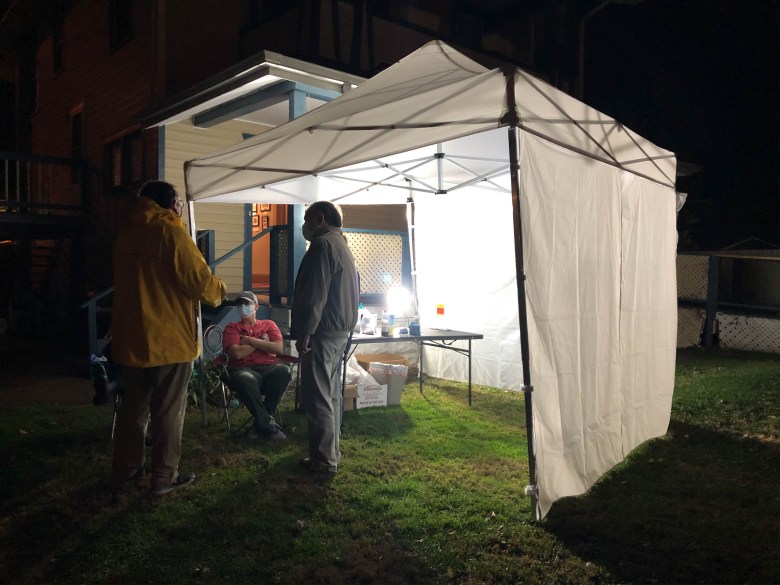
“We need to have continued conversations about how we move forward with harm reduction,” said Teague, referring to syringe access programs. “That’s such a politically toxic issue, but we’ve got to talk about it: how can we do it and do it in a way that’s evidence-based and as palatable as possible for all.”
While SOAR waits for the police investigation to move forward, and to hear from the city — the group says it has reached out to the Mayor’s Office but hasn’t heard back — Parker, Solomon and others are planning their next steps. The nonprofit has submitted a request to become a certified harm reduction program in West Virginia and applied for grant money to help fund continued work.
Sitting at a table within reach of the capitol complex on a cold Tuesday night in late-November, Parker sipped at a mug of steaming chai. The sun had set and the air was still.
“This just feels like a really big moment for our state,” Parker said, clinging to the cup of tea. “Eyes are always on Charleston, and not just in the state, but nationally when it comes to drugs and addiction. Like we’re ground zero. And this could put us on the board for doing something right.”
Last legislative session, a bill was introduced that, if passed, would have banned the distribution of needles in West Virginia. The bill failed, but many expect it will be reintroduced this year.
Although the fate of syringe access in Charleston and across the state is currently up in the air, Parker said long-term, services aren’t going anywhere.
She leaned back in her chair.
“I think there’s a part of me that understands, when I sit and talk with someone, why they want people who use drugs to leave,” Parker said. “But the reality is that this population isn’t going anywhere. This problem isn’t going anywhere. And by ignoring it, we’re just making it worse.”
SOAR anticipates it will receive word on its certification status from the state sometime this month. Until then, the group said they will continue to go out. They’re making plans to return full syringe services to the people who rely on them as soon as possible.
“Doing nothing is unconscionable,” Parker said. “As hard as this work is, I see so much potential for good. This is a conversation about better policy and legislation that’s driven by people’s needs— not, you know, whatever it’s driven by now.”
Reach reporter Lauren Peace at [email protected].



